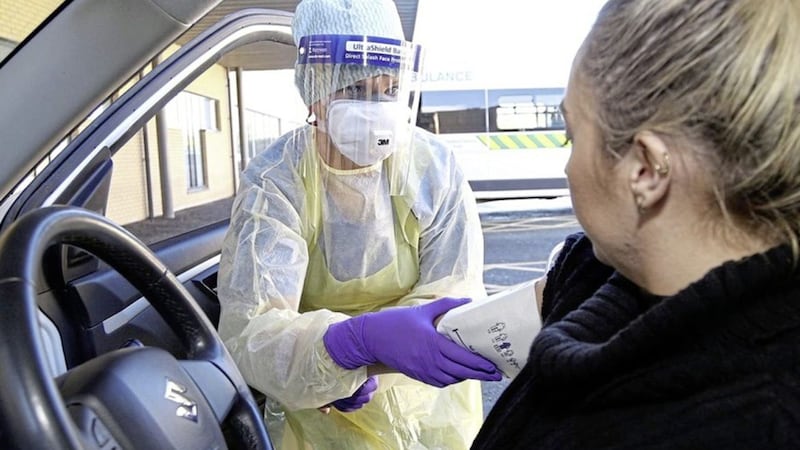As Stormont’s coronavirus disagreements move on to testing, it is worth understanding how the UK and the Republic of Ireland differ on the issue.
The Irish government opened community testing centres two weeks ago to reduce the peak of the epidemic by tracing and isolating cases, as recommended by the World Health Organisation.
The UK initially used testing to try to stop or contain the epidemic. It abandoned this two weeks ago and had not planned to move on to community testing until the first peak of the epidemic had passed, having been advised by Imperial College London there would be too many cases in the meantime to make tracing and isolation practical. Lockdown would be used to suppress the peak instead.
Reluctance to admit this - and admit a U-turn is underway - is why Downing Street press conferences have been so strangulated.
Northern Ireland will be somewhere in the middle, beginning community testing next week as the peak approaches. Stormont has added its own unique take on joined-up government by re-purposing the MOT test centres it had to close due to broken lifts
**
How much community testing to perform and when are subjects of scientific debate but there is no question healthcare workers should be tested as often as possible. Although Northern Ireland is doing somewhat better at this than Britain, self-isolation is already causing huge NHS staffing problems. Ironically, the row at Stormont over closing schools was largely due to projections that one quarter of NHS staff would be lost to childcare. The Royal College of Physicians now reports one quarter of NHS doctors are sick or self-isolating. Belfast Trust says 10 per cent of its entire workforce is self-isolating.
**
UUP health minister Robin Swann has been mocked for telling people not to have accidents around the house or on the roads, as if people can decide not to have accidents. Everyone has forgotten that government constantly tells people not to have accidents, which raises the question of how much all such warnings are ever worth.
Swann has a long way to go to match his direct rule predecessor Angela Smith, who in 2005 ordered an equality impact assessment into a 52-page multi-agency home accident prevention strategy following a two-year consultation exercise.
This never appeared, sadly denying us a Derry Girls-style table of Protestant versus Catholic likelihoods of hitting your thumb with a hammer.
**
The Irish government has rejected a call by Belfast-born epidemiologist Dr Gabriel Scally to “control movement to and from the island” on an all-Ireland basis. Dr Scally said not doing so is squandering a “geographical advantage.”
Tanaiste Simon Coveney cited EU advice that border controls are counter-productive to tackling the epidemic, although that point seems moot now the Republic is the only EU state not to have imposed controls. Ten have closed their borders completely.
The concern for Dublin, largely missed in the north, is that the south would bear the burden of control. Northern Ireland is down to one or two flights per day, all from London. Dublin Airport still has 20 daily arrivals from across Europe.
**
The question of whether army personnel will help construct field hospitals has caused Sinn Féin ministers some discomfort. This is an unnecessary controversy for many reasons, above all because everyone long ago conceded to far more troops in Northern Ireland than the coronavirus response will involve.
After the St Andrews agreement, the Ministry of Defence officially ended its Troubles-era operation and pledged a maximum deployment of 5,000 personnel. Actual numbers have since fallen to 1,300 and the emergency deployment for the entire UK is 20,000, which is 700 pro rata for Northern Ireland. So there might be 2,000 troops here at most - well under half the accepted limit.
**
Recycling really is a religion. Belfast City Council has reversed last week’s decision not to collect food waste bins, an irresponsible absurdity that cannot have been unconnected to poor relations with staff. While the decision stood, the council insisted recycling should not be affected. It told householders to keep sorting and storing their waste, despite the obvious health hazard. The mayor even issued advice on composting food, although this does not work without specialist equipment.
The council is still urging householders to facilitate recycling, despite having to chuck a mix of bins into the back of the same lorry to catch up with the backlog.
Even in these grim days of life and death pronouncements, it is still sacrilege to admit a week of cardboard is going to landfill.
**
I suppose I should note the passing of a Stormont budget, given how momentous this would be under any other circumstances. Sinn Féin finance minister Conor Murphy has achieved in two months what his predecessor Máirtín Ó Muilleoir could not manage in a year and an executive last accomplished in 2015.
It is only a one-year budget, with only top-line allocations to departments. An extra £1bn for coronavirus has only deferred difficult decisions. But by our admittedly low standards, it is progress.









